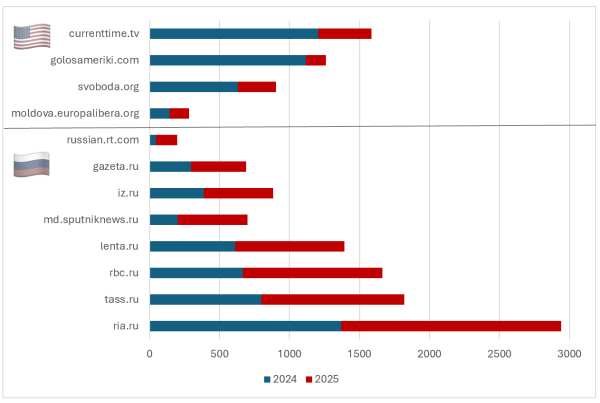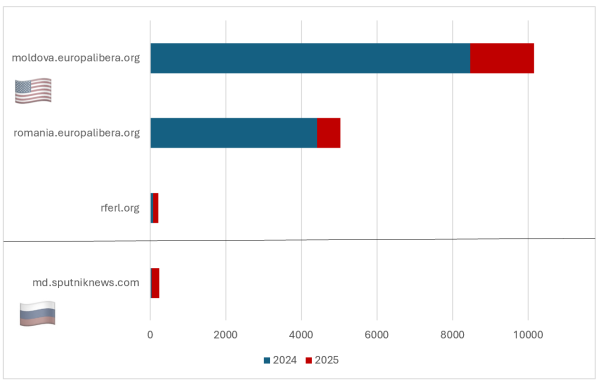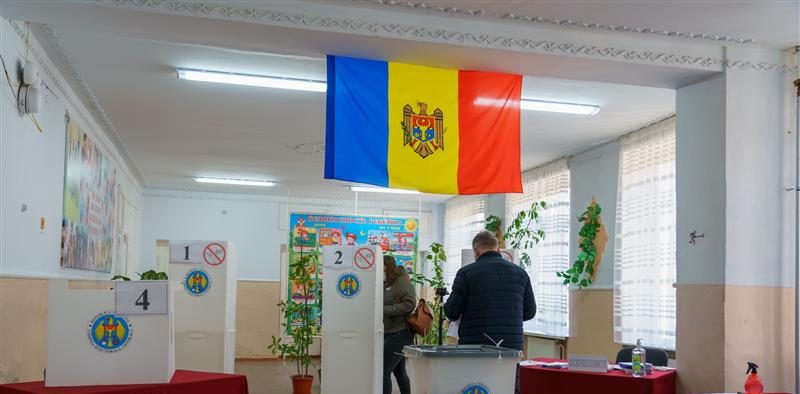Moldovans return to the polls on Sunday to vote for their parliamentary representatives in an election whose outcome could determine whether the country continues its path towards EU membership or pivots back toward closer relations with Moscow. Given the geopolitical stakes, observers have alleged that the Kremlin is once again attempting to interfere in the election through information operations, vote buying, and incitement of “mass riots”, in what former GMF colleague Laura Thornton has argued should be considered a “multi-vector war” rather than an “influence operation”.
Although much of the Kremlin’s malign activities in Moldova are conducted covertly, the Russian government also invests significant resources to overtly influence public opinion, primarily through its vast network of state-backed propaganda outlets. Despite efforts by the Moldovan government to restrict or ban some of those outlets, content from Kremlin-controlled or aligned sources remains widely available online in Moldova, including on search engines.
To better understand the prevalence of Russian sources on search engines, ASD conducted research prior to last year’s presidential election and EU referendum in Moldova to determine the sources encountered by Russian- and Romanian-speakers in Moldova when they queried topics relevant to those elections. ASD did not intend to study the relative influence of US government-funded outlets, but one of the study’s noteworthy findings was the prominence, particularly in Romanian-language results, of several US-funded outlets under the aegis of the US Agency for Global Media (USAGM). In fact, during the studied period, the Moldovan and Romanian versions of US-funded Radio Free Europe/Radio Liberty (RFE/RL) had, respectively, the most and second-most links in search results generated by Romanian-language search queries. Although USAGM outlets were less visible in Russian-language search results, three US government-funded outlets ranked among the 50 most-observed sites in our study, suggesting that USAGM outlets were, at least in search environments, providing a counterbalance to pro-Kremlin propaganda.
That study, however, was conducted months before US President Donald Trump signed an executive order to reduce USAGM personnel “to the minimum presence and function required by law”. In response to that directive, USAGM Senior Advisor Kari Lake announced plans to cut USAGM’s workforce from more than 1,000 to 81. Although the legality of those cuts continues to be litigated, hundreds of USAGM employees have been laid off, crippling or at the very least significantly hindering the operations of USAGM’s affiliated media networks around the world. Given our past findings and the upcoming elections in Moldova, this led us to question what the impact of those cuts has been on the Moldovan information environment.
Methodology
In ASD’s previous study, researchers ran daily search queries, geolocated in Moldova, for 80 search terms in Romanian and 113 terms in Russian across Google and Yandex between September 25-November 4, 2024. Researchers then aggregated all links that surfaced in search results to determine which websites appeared most often and most prominently.
To compare results before and after the cuts to USAGM, we ran the same search queries over a similar length of time prior to the elections (August 12-September 23, 2025) scheduled for September 28, 2025. The decision to keep search queries consistent between the two studied periods had some drawbacks. While many search topics remained relevant—such as those related to corruption and foreign influence, for example—others, like the names of presidential candidates and the EU referendum, were less relevant to this year’s elections. As a result, some search queries surfaced dated articles from before the 2024 elections, somewhat complicating our ability to determine the impact of cuts to USAGM. ASD attempted to address this issue by reviewing the publication dates of the most observed articles.
Russian-Language Search Results: The Decline of USAGM and the Rise of Russian State Media
In our study prior to the 2024 elections, three US government-funded Russian-language outlets ranked among the 50 most-observed domains in Russian-language search results: Current Time (currenttime.tv, 14th most observed), a 24-hour television and digital outlet associated with RFE/RL and Voice of America (VOA); VOA’s Russian service (golosameriki.com,16th); and Radio Svoboda (Svoboda.org, 30th), RFE/RL’s Russian-language branch. In our latest study, all three of those outlets saw a precipitous decline in their relative number of links generated by Russian-language queries compared to other outlets. Current Time dropped from the 14th to the 33rd most-observed website, Radio Svoboda fell from the 30th to the 41st most-observed site, and VOA’s Russian service slipped all the way from the 16th to the 104th most-observed site. But even those sharp declines fail to tell the full story. The median search rank of observed articles from the three US government-funded outlets ranged from 19th to 25th, meaning those articles typically appeared on the second or third page of search results. Moreover, of the ten most-observed articles from US government-funded outlets, only one was published in 2025, with the most frequently occurring links appearing in results generated by queries more relevant to the 2024 election. This suggests that the visibility of USAGM outlets will likely continue to decline over time as their content becomes less recent and relevant.
Although causation is difficult to prove, the declining relevance of US government-funded media from last year’s to this year’s Moldovan elections coincided with a significant jump in the relative visibility of Russian state-media outlets. In our 2024 study, only one Russian state-controlled outlet, RIA Novosti, was among the ten most-observed outlets in search results generated by Russian-language queries. In total, there were three Russian state-controlled outlets among the 50 most-observed sites in Russian-language search results: RIA Novosti (ria.ru, tenth), Interfax (Interfax.ru, 13th), and TASS (tass.ru, 22nd). Lenta.ru and Gazeta.ru—two Russian outlets that the State Media Monitor defines as state-captured (meaning that, though they are not directly financed by the government, they lack editorial independence)—ranked, respectively, as the 30th and 50th most-observed sites. Sputnik and RT, which are banned in Moldova, did not appear among the 50 most-observed domains, though they surfaced occasionally in Yandex search results.
In our latest study, there were seven Russian state-controlled or captured outlets among the 50 most-observed sites. All those outlets—apart from Interfax—had more links, relative to other sites, in this study compared to the previous one. RIA Novosti rose from the tenth to the third most-observed site, TASS moved from the 22nd to the sixth most-observed site, and three state-controlled outlets that did not appear among the 50 most-observed sites in our previous study—Sputnik Moldova (md.sputniknews.ru, 22nd), Izvestia (iz.ru, 23rd), and Rossiyskaya Gazeta (rg.ru, 34th)—all jumped into the top 50. Lenta.ru also rose from the 30th to the tenth most-observed site and Gazeta.ru moved from the 50th to the 31st most-observed site. RT’s Russian-language outlet had the 82nd most links in search results, though the individual link with the most occurrences—an August 19, 2025 article claiming that the Moldovan diaspora in Russia was being deprived of the right to vote—had a median search rank of four, meaning it routinely appeared on the first page of results.
Romanian-Language Search Results: UASGM Remains Relevant, but For How Long?
In our 2024 study, US government-funded outlets were far more prominent than Russian state-media outlets in Romanian-language search results, with RFE/RL’s Moldovan (moldova.europalibera.org) and Romanian (romania.europalibera.org) versions ranking, respectively, as the first and second most-observed domains in our study. Although RFE/RL, like all USAGM affiliates, has cut back on programming and staff, it received an emergency €5.5 million grant from the EU in May, allowing the network to, at least for now, continue its critical operations.
In our latest study, these outlets saw marginal declines in the number of links observed in Romanian-language search results compared to other websites. RFE/RL Moldova was the fourth most-observed outlet, while RFE/RL Romania ranked 13th. The three domains with the most links in our study, however, were social media or user-generated sites, meaning there were more links to RFE/RL Moldova articles than any other news outlet. But this finding again papers over more concerning trends. Of all links generated during our study, the percentage of links from the two Romanian-language RFE/RL sites declined significantly from the year prior. In our study before the 2024 Moldovan elections, the two RFE/RL outlets accounted for a remarkable 15% of all links generated by Romanian-language search queries. Prior to the 2025 election, that number dropped to 4%. As with Russian-language results, the majority of the most observed articles (seven of ten) from the two RFE/RL outlets were published prior to 2025, again suggesting that the staying power of USAGM outlets will wane over time.
Consistent with our 2024 study, Russian state-media outlets had limited visibility in Romanian-language search results. There were no Russian state-media outlets among the 50 outlets with the most-observed links in our study. However, the Moldovan version of Sputnik News (md.sputniknews.com) had the 56th most links of any website in Romanian-language search results. Although Russian state-media outlets were not as prominent in Romanian-language search results as they were in Russian-language results, there were 282 links to Russian state-media outlets, a 276% increase compared to our 2024 study.

Figure 1: Comparison of the Most Prominent Russian- and US Government-Funded News Outlets across Russian-Language Search Results on Google and Yandex in our 2024 and 2025 study.

Figure 2: Comparison of the Most Prominent Russian- and US Government-Funded News Outlets across Romanian-Language Search Results on Google and Yandex in our 2024 and 2025 study.
Conclusion
The effects are already visible just months after USAGM began to dismantle its global operations. Prior to the 2024 Moldovan elections, USAGM outlets—in Romanian and Russian—were providing a real alternative to Kremlin-backed propaganda. Less than a year later, US government-funded broadcasters are slowly but steadily receding from view, to the seeming benefit of Russian propagandists. The result is that Moldovans, before an election whose outcome has enormous implications not just for Moldova but all of Europe, are less likely to encounter free media and more likely to encounter media aligned with, if not directly controlled by, the Kremlin.
The views expressed in GMF publications and commentary are the views of the author alone.





